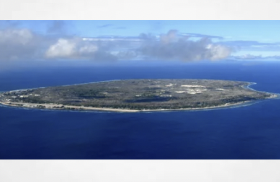The Guardian
In closed hearing, Alison Battisson says country has a ‘terrifying’ record of detaining people unlawfully for indefinite periods
An Australian human rights lawyer and a former long-term immigration detainee have given private testimony to the United Nations on Australia’s detention and consular practices, condemning successive governments for “criminalising immigration” and alleging inadequate support for victims of hostage diplomacy.
Alison Battisson, from the charitable law firm Human Rights for All, and the former detainee Said Imasi addressed the UN working group on arbitrary detention in Geneva this week, in special closed sessions marking the group’s 30th anniversary.
Invited to appear in person, Battisson told the working group on Wednesday that Australia operated “immigration prisons” in which people faced arbitrary long-term detention and – until last year’s high court ruling in the NZYQ case – in some cases had been held indefinitely.
“Australia has a terrifying record for the length of time refugees and stateless people are detained,” Battisson said in testimony obtained by Guardian Australia. “I have clients who were detained for over 13 years … with the long-term average being approximately eight to 10 years of administrative detention.”

She outlined the high court’s finding last year that indefinite detention was unlawful but said the situation had “not dramatically improved” since.
A spokesperson for the Department of Foreign Affairs and Trade spokesperson said Australia “stands resolutely against the practice of arbitrary detention, arrest and sentencing wherever it may occur, including when used for diplomatic leverage”.
“Australia will continue to support the building of a strong international coalition to deter this unacceptable practice,” the spokesperson said. “We will also continue to work with partners to highlight the harsh impacts on individuals and their families and to work together to help mitigate those impacts.”
Guardian Australia understands Australia’s mission in Geneva may not have been notified of this week’s the working group sessions.
In Geneva, Battisson accused the Albanese government of failing to proactively identify people in detention now entitled to be released, saying it was being left to lawyers to threaten legal action.
“More than 12 months after NZYQ, I am still identifying multiple people every month who are unlawfully imprisoned, including very vulnerable young people and queer people,” she said. “Given their detention is a breach of our constitution, this is a terrible indictment of the Australian government’s commitment to our separation of powers.”
Battisson said the imposition of a minimum 12-month jail term for breaching visa conditions was “the very definition of criminalising immigration”.
She detailed the court’s further separate finding on 6 November that the imposition of ankle-monitoring devices and curfews was unconstitutional – a ruling that prompted the government to rush legislation into parliament to authorise the practices.
Australia’s offshore-processing system featured in her presentation, including its renewed arrangement with Nauru to detain asylum seekers intercepted trying to come to Australia by boat, and the situation of 57 men “stuck in limbo” in Papua New Guinea.
“Australia’s policy of sending refugees to other nations for processing has infected the rest of the world,” she told the UN group.
Read more





